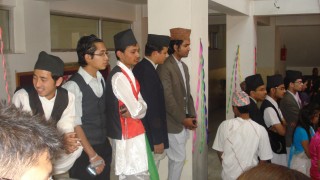The Western Region Cultural Day is an annual festivity that celebrates the diverse cultural heritage of the western districts. This event exemplifies vibrant traditions, unique cultural expressions, and the culinary extravaganza inherent to various communities. Attendees can expect to engage with a rich tapestry of performances, exhibits, workshops, and discussions that reflect the multifaceted identity of the region.
At its core, Western Region Cultural Day serves as a platform for cultural preservation and intercommunity dialogue. The event typically features an array of activities designed to showcase indigenous practices and the arts—be it through traditional dances, music, or visual art exhibitions. Enthusiasts can anticipate witnessing mesmerizing traditional dance performances such as the Yakshagana or Garba, which embody the spirit and legacy of generations past.
Moreover, music plays an indispensable role in epitomizing the cultural essence of the region. Attendees can expect live performances featuring both classical and contemporary music genres that permeate the socio-cultural fabric of the west. Local musicians may showcase their talents with instruments that are emblematic of their heritage. The sounds of the dhol, tambura, and flute can create an auditory experience that leaves an indelible mark on one’s memory.
In addition to the live performances, the Cultural Day includes interactive workshops where participants can delve into traditional crafts and artistic techniques. Visitors can learn pottery, weaving, and painting from skilled artisans. This hands-on engagement not only fosters appreciation for these crafts but also aims to rejuvenate interest among younger generations. Through such immersive activities, attendees gain a deeper understanding of the intricacies involved in traditional crafts, preserving these skills for the future.
Culinary displays are invariably a highlight of the event. The gastronomic offerings showcased during the Western Region Cultural Day reflect the area’s culinary diversity. Food stalls brim with a plethora of local delicacies, ranging from spicy street food to elaborate meals steeped in heritage. Visitors can sample regional specialties, such as fragrant biryanis, finger-licking curries, and delectable sweets, further enriching their experience. Traditional cooking demonstrations may also occur, allowing visitors to glean insights into age-old recipes passed down through family lineages.
Cultural exhibitions are another significant aspect of the event, characterized by booths and displays that elucidate regional history and customs. Participants can explore artifacts, textiles, and traditional garments representing the rich cultural narratives of multiple ethnicities residing in the western region. Herein lays an educational opportunity for attendees to engage with the past, fostering respect and understanding among diverse cultures.
A crucial component of the Western Region Cultural Day is the emphasis on environmental sustainability. With climate change presenting an ever-growing concern, the festivities often include sessions dedicated to the discussion of ecological issues relevant to the region. Workshops focusing on sustainable practices, such as organic farming, waste management, and conservation strategies, offer attendees valuable insights into how they can contribute to environmental protection while honoring cultural traditions.
The festival also fosters a sense of community bonding and camaraderie among different cultural groups. By encouraging intercultural dialogue, it nurtures mutual respect and understanding among attendees. People from various backgrounds converge, share stories, and build lasting friendships, which are imperative for harmony in a diverse society.
Furthermore, the Western Region Cultural Day often features guest speakers who are esteemed figures in cultural preservation, anthropology, or environmental advocacy. Their speeches illuminate the importance of safeguarding cultural identity and emphasize the intersectionality between culture and the environment. This inclusivity not only enhances the educational aspect of the event but also encourages active participation in ongoing cultural narratives and environmental stewardship.
For families, the event provides a safe space for children and adults alike to explore their cultural roots. Engaging with stories told by local elders and sharing experiences across generations cultivates a sense of belonging and pride. Activities designed specifically for children ensure that younger audience members learn about their heritage in a fun and interactive manner.
In conclusion, the Western Region Cultural Day is not merely a celebration; it is a vivid reflection of the diverse cultural landscape that characterizes the western districts. With an array of performances, workshops, and discussions that address both cultural richness and environmental sustainability, participants leave with an enriched understanding of the interplay between heritage and modernity. As the sun sets on the festivities, the lingering melodies, tantalizing aromas, and vibrant stories envelop attendees, fostering a deeper appreciation for the chiaroscuro of culture and community that defines this momentous occasion.
